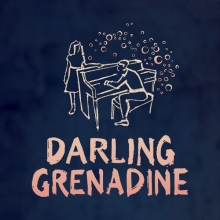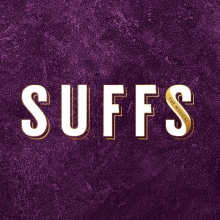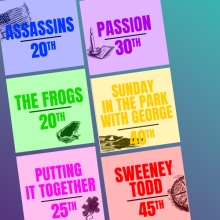
Full Synopsis
Act One
The show opens on the interior of the humble cottage where Mrs. Wilson and her daughter, Mary, are discovered side-by-side in rocking chairs, sewing on embroidery hoops. Their lives are not going very well. The mortgage is overdue and the ceiling is falling through. Nevertheless, they are hoping for something good ("Something Good Will Happen Soon"). They are worried that their cottage will be sold since the landlord, Mr. Middleton, is at death's door. If he dies, they wonder what will happen to them and where they will go.
Suddenly, there is a knock at the door as the villain, the foul-tempered lawyer, Mr. Cribbs, enters to inform the two ladies that his client, Mr. Middleton, has indeed passed away. He lewdly gazes at poor Mary as he tells them that Mr. Cribbs had many bad investments and many debts that must be paid. The Wilson's cottage must be sold, and the ladies will have to find somewhere else to live. After coldly disclosing this news, the villain leaves.
Mr. Middleton has a surviving son, Edward, and, although this young man is known to be a bit reckless and given to excess, perhaps the women can convince him not to sell the cottage. They gather up all of the rent money that they have saved as Mary prepares to take it over to meet with Edward and ask him for help. While Mary makes her way over to Edward's house, Mr. Cribbs prances around, enjoying all of the evil in the world ("Don't Swat Your Mother").
In a wooded glade, Edward, our hero, enters confidently and handsomely dressed. He is stopped by Mr. Cribbs, who tries to discuss with him the selling of the Wilson cottage and its adjoining land. Edward has no intention of selling the cottage or land. He knows that his father had the highest esteem for the Wilsons, and Edward would never deprive them of a home. Hearing this, an angered Mr. Cribbs exits.
Mr. Cribbs swiftly returns, however, and suggests to Edward that, since young Mary is without a father, it would be very easy for him simply to take her for his own. Hearing these lewd thoughts infuriates Edward and he chases after Mr. Cribbs. Edward is about to strike Mr. Cribbs when Mary, who has been peeking out from behind the tree, rushes forward and grasps Edward's arm. She begs forgiveness for Mr. Cribbs, and the villain angrily escapes.
Mary prepares to give Edward the rent money. He refuses it, however, insisting that she keep it as a portion of her dowry. The two have fallen in love at first sight and offer vows, planning to wed ("Peace and Love").
It appears as if Mr. Cribbs' plan is falling apart. If Edward weds young Mary, there is no way that the cottage will be sold, keeping him (as the attached lawyer) from reaping the profits. Mr. Cribbs, however, is not giving up that easily. He will use liquor as his potion to destroy Edward; a plan that has worked for him before. Edward's foster brother, William Dowton, comes along the path. Mr. Cribbs tries speaking with him, but William has no time, proclaiming that Edward is getting married and there is much to do. Mr. Cribbs tries to get an invitation, but William refuses. William leaves, and Mr. Cribbs hears the singing of Agnes, William's insane sister. At one time, she was a happy girl who was engaged to wed. Mr. Cribbs, however, turned her fiancé on to drinking, and the young man died in a drunken fit. She has never been the same since that time.
Deranged Agnes enters and speaks of the wedding preparations that she has observed. She confronts Mr. Cribbs, crying that he ruined her life the very moment he turned her husband on to drinking. The crazy woman chases him, and Cribbs attempts to hit her with his cane. Just then, William returns and takes Mr. Cribbs by the collar. Williams says that, were it not for the fact that Mr. Cribbs is an old man, he would break every bone in his body. William restrains himself, however, choosing good over evil, and lets Cribbs go ("Good Is Good").
Mary and William have a wonderful wedding, and everything appears to be going well for the happy couple. The village celebrates ("Mrs. Mary Middleton") while Mr. Cribbs hands a bottle of wine to the Preacher, who doesn't know quite what to do with it. Edward, however, looks at the bottle and prepares to take a sip. Mary tries to stop her new husband from taking a drink, but he persists, telling her that it is only in social celebration. Unfortunately, after his first drink, he appears to be quite taken with the new beverage.
Act Two
Some years later, Edward is discovered in a village bar, disheveled and drinking quite heavily. He has been wandering from one bar to the next, drinking his nights away. Mr. Cribbs has been along all the time, helping to keep poor Edward in a drunken state.
Suddenly, a great deal of commotion ensues as Carrie Nation works her way to Edward and speaks to him of redemption through complete abstinence from alcohol. Mr. Cribbs tries to argue with her about the virtues of drinking, but she has no time for this. Our villain, however, is a very powerful man, and everyone in the bar has soon joined him in celebrating his views of alcohol ("Have Another Drink"). Carrie tries to stop him, but to no avail. They all continue drinking as Carrie leaves in frustration.
By this time, Edward is totally intoxicated, and even the bartender tries to send him home. Edward refuses, though, causing another stir and eventually passing out on the floor. William enters, finds his wounded brother and tries to help him home. He reprimands Edward for his behavior and accuses the bartenders assisting his brother's demise. It is then that Edward remembers the man that he used to be and realizes what he has become – a drunkard ("Curse of an Aching Heart"). Still in a drunken stupor, Edward passes out again.
Mr. Cribbs adores how the situation is playing itself out. He delivers a monologue to the audience about living life to the fullest ("When You're Dead").
In a wooded glade, a trembling Edward enters, more out-of-sorts than ever. He proceeds to his secret hiding place behind the tree stump and retrieves his bottle of liquor, which he guzzles until it is gone. He prepares to go but is stopped by Cribbs, who quickly tries to tempt him with a flask of brandy. Edward tries to resist but he cannot; he chugs the flask while Cribbs laughs maniacally. Once Edward is completely drunk, the two join in song, celebrating the joys of drinking ("Cup of Coffee").
Inside the Wilson cottage, poor Mary is sobbing about her situation. Her husband is a drunk, there is little money left and her mother is near death. Little Julia, her daughter, tries to console her mother. William enters with more news of Edward and his drunken ways. When Mary sees her husband's completely disheveled appearance, she completely breaks down ("Something Good Will Happen Soon"). Hearing all of the commotion, Mrs. Wilson runs out and screams for silence. Unfortunately, her screams bring about a sudden heart attack, and she dies. Edward realizes that he is to blame for everyone's hardships and decides to leave forever.
Act Three
The curtain rises on a street in the Bowery in New York City. Mr. Cribbs removes a cover from a trash barrel where Edward is still in a drunken stupor. Edward asks Cribbs about his wife and child and is informed that they would like to see him if he indeed became a respectable member of society. Cribbs tries to convince Edward to forge a check for $5000, persuading him that money would make him respectable. Edward does not, and a disappointed Mr. Cribbs leaves him alone, drunk and destitute ("Garbage Can Blues").
Inside a cold, one-room, New York City tenement, Mary is working at the ironing board as Julia sleeps on a simple straw pallet. It appears as if the mother and child are also in the most desperate of circumstances, without money or food. Mr. Cribbs enters in a swirl of snowflakes. Mary is desperately trying to find her husband, and Cribbs tries to convince her that Edward is probably off with another young woman. She dismisses his comment, for, as far as she's concerned, Edward's only fault is intemperance, not infidelity.
Mr. Cribbs attempts to make his move on Mary, but she has no interest in him. He tries to seize her, but she resists his lascivious embraces. Things get more intense as Julia even joins in to help her poor mother. Just when Mr. Cribbs is about to win, William enters and intercedes. Holding Mr. Cribbs, he offers the villain one more chance at redemption, but Cribbs proclaims, "A villain I have lived. A villain let me die." With that, William throws Mr. Cribbs down a flight of stairs, killing him. William is determined to help Mary find her husband. The two leave to search the entire city while Little Julia thinks about how the joys of nature are far better than the joys of wine ("Julia's Song").
The scene opens on Edward in a heap of tattered clothing, atop a curbstone. The Salvation Army appears and approaches Edward, asking him if he wants to be saved ("Do You Want to Be Saved?"). At first, Edward resists, saying that it is too late for him, but he slowly begins to listen to the leader and is further persuaded as William, Julia and Mary discover him and offer him help. As a final point of persuasion, everyone points up at Mr. Cribbs, who magically appears from above. He is all in white, complete with a small harp and angel wings. Suddenly, as if by magic, Edward is ready to be saved and is transformed into a neatly dressed citizen, complete with black suit, collar and tie.
Newly reformed, Edward and the cast focus on the sinners of the audience, asking them if they, too, wish to be saved.
"Look up to heaven, brother
Say down with demon rum!"
Show History
Inspiration
The Drunkard is based on the notable American temperance play, first performed in 1844. It was written as a way to capitalize on the Temperance Movement at the time, which sought to wipe out alcohol consumption across the United States. The play was one of the most popular dramatized works in Americna history until the stage version of Uncle Tom's Cabin several years later. It opened at the Boston Museum and ran for 140 performances, which was an astonishing feat in those days. Famed circus owner, P. T. Barnum, caught wind of the show's popularity and produced his own production at the Moral Lecture Room in his American Museum in New York City for 150 performances. Many revivals of The Drunkard have come and gone since then, most notably a production at the Theatre Mart is Los Angeles that ran for 36 years. The play has also spurned many other musical versions, including one at the Tulsa Spotlight Theatre that has been allegedly running every Saturday night since 1953.
Manilow was brought into the fold on the musical through a series of fortunate events. He had been working in the mailroom of CBS for some time in order to pay for his education at Julliard. A director whom he had met at CBS approached him (at only the age of 19) about arranging several public domain songs into a score for this new musicalized version of the melodramatic play. Manilow jumped at the opportunity, but deciding to write an entirely new score by himself.
Productions
This version of The Drunkard premiered in 1964, after playwright, Bo Herrod, decided to bring his own adaptation to the stage with the help of Barry Manilow's music. The premiere production opened at the 13th Street Theatre in New York City. A revised version by the same authors reopened there on April 13, 1970, and ran for the next two years.
Cultural Influence
- Composer, Barry Manilow's, work on The Drunkard was a great kickstart to his eventual pop music career. After the musical went up, Manilow got bumped up to a jingle writer at CBS, and the rest was history.
Trivia
- The original Off-Broadway cast of The Drunkard included performances from Christopher Cable, Joy Garrett, Clay Johns, Drew Murphy, Susan Rush, Donna Sanders, Marie Santell and Lou Vitacco.
Critical Reaction
"A damsel-on-the-railroad-tracks morality play, full of laughs, heartache, joy and song. Adapted by Bro Herrod and set to music and lyrics by Barry Manilow..., The Drunkard is more than an evening's delightful entertainment[;] it's a cathartic musical elixir for troubled times."
– The Red Rock Review
"This adaptation's main contributions are the many... pleasing tunes... and the silly puns."
– The Chicago Reader
"The early-Manilow score is easy... on the ears, and a couple of the songs 'Have Another Drink' and the gospel finale 'Do You Want to Be Saved' give a hint of the pop writing prowess he would soon display."
– Talkin' Broadway
"High camp and ridiculous melodrama... it would be nearly impossible not to be entertained by the subversiveness of [Manilow's] lyrics. ...A consistent package of well-tuned parody and clever performance."
– The Houston Press
Billing
- Music and Lyrics by
- Adapted by
Based on the world-famous melodrama by W. H. S. Smith
Requirements
|
Adapted by
BRO HERROD
|
Music and Lyrics by
BARRY MANILOW
|
(Based on the world famous melodrama by W. H. S. Smith)
Video Warning
In accordance with the Performance License, you MUST include the following warning in all programs and in a pre-show announcement:ANY VIDEO AND/OR AUDIO RECORDING OF THIS PRODUCTION IS STRICTLY PROHIBITED.
Included Materials
| Item | Quantity Included |
|---|---|
| LIBRETTO/VOCAL BOOK | 15 |
| PIANO CONDUCTOR'S SCORE | 2 |
Production Resources
| Resource |
|---|
| HOW DOES THE SHOW GO ON-10/CS |
| HOW DOES THE SHOW GO ON? |
| PRODUCTIONPRO-DIGITAL SCRIPT/SCORE |
| STAGE WRITE APPLICATION |




